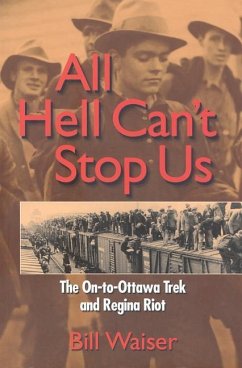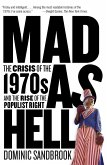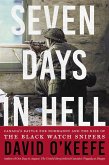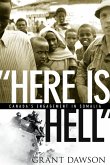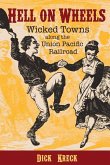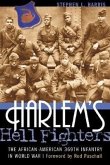The Great Depression of the 1930s brought drought, unemployment, and poverty to the West, and the token wages from the government's "make work" projects only fanned the flames of unrest. In 1935, this unrest took on a purpose: to march on Ottawa and demand a solution from Prime Minister R. B. Bennett. Thus was born the On-to-Ottawa trek, which culminated in the Regina Riot, where the protestes and RCMP clashed in one of Canada's most significant historic events. All Hell Can't Stop Us: The On-to-Ottawa Trek and Regina Riot is noted historian Bill Waiser's detailed retelling of one of the seminal moments in Canadian history. This new, balanced history is based on a number of new sources that have only become available in the last few decades, including previously closed RCMP records, Regina City police records (now available through the Access to Information and Privacy Division) and the papers of John Gregory (Jack) King, one of the leading figures in the Regina Citizen's Emergency Committee. Other primary sources consulted were the records of the Regina Riot Inquiry Commission and trial transcripts for those charged with rioting or related offenses - most of these records had never been consulted since they were filed in 1936. In April 1935, many young unemployed single men left work camps in British Columbia where they often laboured six and a half days a week for 20 cents a day. They congregated and organized in the city of Vancouver led by Arthur "Slim" Evans. After two months of unsuccessful struggle for union wages, they decided to take their case direct to Ottawa and the Prime Minister. Their journey came to be known as the On-to-Ottawa Trek. They left Vancouver on June 3. "Riding the rod" (on and in railway freight cars) across mountains and prairie they reached Regina, still only half way to Ottawa. Here they were stopped by the RCMP on orders from Bennett in Ottawa, and a month later, on Dominion Day (July 1) the Regina Riot ended the trek, when police ill-advisedly tried to round up the group leaders during a peaceful protest march. The official toll of the encounter was one dead, dozens injured, and over 100 people arrested, but Waiser has uncovered evidence that these statistics don't tell the whole story. In the course of research for All Hell Can't Stop Us he not only discovered nine previously unpublished sketches of the scene of the riot, but also found references to a second man, Nicholas (Nick) Shaack, who died as a result of blows inflicted by the RCMP - a death that was never recorded or investigated by the RCMP. A death that strengthens arguments of unwarranted RCMP brutality that night. While the trek was suppressed, its ideals were not lost. The trek and the riot captured the hearts and minds of Canadians who sympathized with the hopes and dreams of the men involved. It came to epitomize all that was wrong with the federal government's handling of the single homeless unemployed during the depression. In the federal election a few months later, the Conservative government went down to resounding defeat. The new Liberal government felt compelled to abolish the camps, and further reforms established much of the social system we
Hinweis: Dieser Artikel kann nur an eine deutsche Lieferadresse ausgeliefert werden.
Hinweis: Dieser Artikel kann nur an eine deutsche Lieferadresse ausgeliefert werden.

